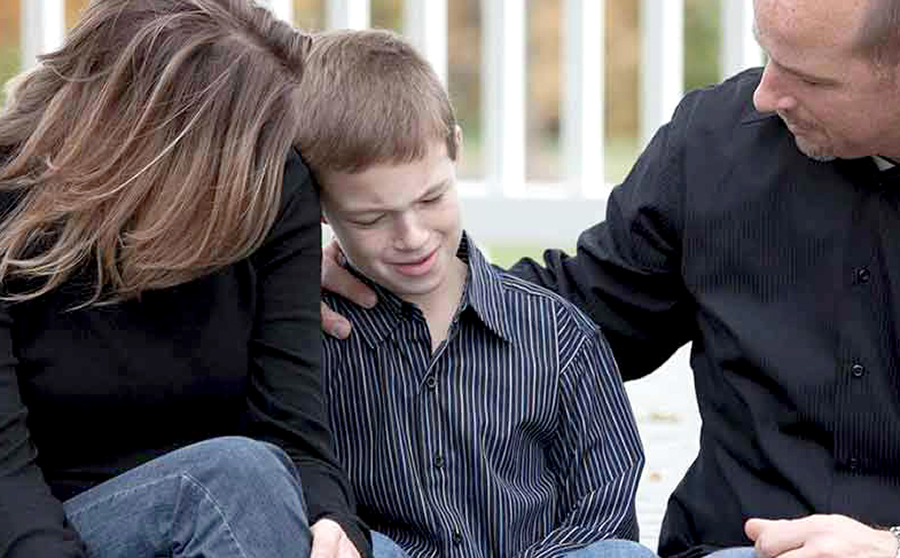Parenting: Consider the Option of Telling the Truth
Consider telling the truth
Telling the Truth to Children
Always at least consider the option
by Gregory A. Barrett, M.D.
Parents at some time or other will inevitably be placed in the situation of having to speak to their children about a topic of considerable importance. And when tough issues arise, the lengths they will go and the artifices they will invent to avoid directly addressing the subject can be quite amazing. “Why tell the truth when a lie would suffice?” is an all-too-common instinctive response.
The motivation behind this is generally a desire on part of Mom and Dad to shield their offspring from reality. Now granted, many factors will be involved in deciding how to optimally deliver the news but nonetheless a certain principle applies, and that is to always attempt to be quite straightforward in your presentation.
Adoption

Let’s start with a fairly simple application of this philosophy. In the case of adoption, a key question is when to inform the child about the special circumstances regarding his or her birth. The answer, using the “first consider the option of telling the truth” approach, should be obvious—immediately, the sooner the better.
Divorce
Divorce is an incredibly difficult matter to discuss, and for good reason. Everyone in the family generally carries some degree of guilt about the breakup, the parents realizing fully well the huge upheaval the dissolution will cause for their kids, whereas children inevitably sense that in some way it must be their fault. “If only I had kept my bedroom cleaner this wouldn’t be happening and my mommy and my daddy would still be together,” is typical of a child’s reasoning.

Therefore, when the time comes to explain the facts of the separation parents need to act responsibly and, minus any unnecessary recriminations and ill-advised emotions, basically tell it like it is. Don’t mince words with namby-pamby expressions such as, “Mommy and Daddy are going to live apart for a while and see if we like that better,” or, “This is going work out great for your kids—now you’re going to get to have two of everything!”
If you do ever find yourself in this unfortunate situation sit down together with your children and let them know that it is sad for everyone but you are still their mother and their father, you love them with all your heart and always will, you completely understand how hard this will be for them at times but you will try to do everything you can to make it as easy as possible and, most importantly, make it absolutely clear that they are in no way responsible.
The sooner your children grasp an age-appropriate understanding the quicker they will adapt. Divorce is indeed hell for all involved. However, it’s an unfortunate fact of modern life that mistakes are made and if all attempts to rectify the situation have been exhausted, raising children in a hostile environment can do immeasurably more harm than the alternative. Once upon a time two people apparently loved each other enough to make a lifetime commitment, so separation should never be undertaken easily, ESPECIALLY if there are children involved.
Every possible effort should be made to heal the relationship for the sake of the kids, but the long-term effect of staying together might be so incredibly toxic to the children in the house that it makes divorce seem benign by comparison. Your relationship is going to be their blueprint for a marriage and how a husband and wife should treat each other, so think about the message you are sending. And remember—you may be able to fool a lot of people, but the one person you can NEVER fool is your child.
Financial Problems

The loss of the primary breadwinner’s job can be another body blow to a family, and when this occurs it’s frequently second nature on the part of the parents to try to cover up the reality of what has happened. A large part of this appears to be derived from an accompanying sense of shame rendering the mother or father unwilling to confess the truth. Let’s face it, we all want to be a hero in the eyes of our children. But confabulations such as saying Daddy has just decided to stay home for a while won’t fly and will result in even greater anxiety and resentment.
It is a fact, there will be bumps on the road of life. However, if handled appropriately by drawing the family unit together, factually clarifying the situation, brainstorming, acknowledging and praising each other’s sacrifices, and becoming a unified team, this experience can be an important life lesson about the values of perseverance, resilience, and adaptability. Hard times can, if handled correctly, lead to a healthy re-focus of priorities. But for this to happen the truth must be told.
Death
Children will have a differing understanding of death based upon their level of maturity. It is especially unfortunate when a child is confronted with the loss of someone close to them at a very young age. When faced with this situation the parents need to deliver the news openly in language appropriate to the child’s level of comprehension.
Apparently, this can be uniquely problematic because in no other phase of parenting do I consistently see such poor choices of phrasing. Please learn from the mistakes of others and refrain from explanations such as the following:
“Grandpa has just gone to sleep.” Hey, good luck getting your child to go to bed for the next millennium!

“Aunt Bessie went away for a while.” Okay, great, now next time Dad goes away on a business trip “for a while” how do you think that’s going to sit with little Jenny?
“Don’t be sad, Jeffrey, Grandma will always be here with us,” Mommy states, holding her child’s hand as he stares at the wax figure in the coffin. Hmm, just exactly where is Grandma these days? Maybe she’s hiding in little Jeffrey’s closet and planning to sneak out and scare him after Mommy turns out the lights in his bedroom.
So, what should one say? Simple. Don’t overly complicate matters. Begin by informing your child the person has died. Use that precise word and then proceed to elaborate as best you can explicitly what death means in your personal spiritual context accompanied by the truth we all universally take to our hearts, that even though they are no longer here with us we will always remember and honor them through our memories.
Give your child time to ask questions, make sure their understanding is as complete as possible given the limitations of their age, and be prepared to have them return to the topic at unexpected times in the upcoming weeks or months. And don’t be disappointed if your younger children do not seem to be responding appropriately to the loss of someone special. Because of their limited intellectual and emotional capacity, they will be simply unable to appreciate fully the magnitude and permanence of what has happened. Give them a break, and don’t press. After all, how well do any of us truly understand death?
Shielding children from the truth usually leads to even greater fear on their part. A classic example of this in pediatrics is known as a conversion reaction. For the purposes of this exercise let’s say there is a mother who has been informed she has a benign brain tumor. As a consequence of the diagnosis, even though her life and well-being are not truly in jeopardy, there are a lot of shed tears, increasing symptoms, and whispered telephone conversations.
Well, if her child is being kept in the dark, as sure as anything, before you can say boo he or she is going to start having horrific headaches. A conversion reaction is the subconscious acquisition of symptoms similar to those of a loved one, and they can be quite severe. If the mom would have just explained and been more open about what was occurring from the start, all of the pain the child is experiencing could have been avoided.
Major Exceptions to the Rule

There do exist those rare occasions when candor might not be the best policy. In my opinion the two major exceptions to the rule of truth-telling would be your personal past history and Santa Claus. Regarding the first, suppose your adolescent asks you specific questions about illicit behaviors you may have done back in your single days. How do you respond?
Come on, get serious! This is not a parenting primer, this is an advanced course you’re holding in your hands, so if you didn’t know the answer to that question go find yourself another more basic text. 🙂 It is critically important for a parent to always maintain the image of a good role model and if a little white lie is needed from time to time to cover up some sordid aspects of a checkered past then so be it.
And, come on, you don’t really want to sit around trading stories with your teenager, do you? Good lord! Have some dignity, for heaven’s sake! However, at times even here the truth may be the better way to proceed, and that is when a recount of some specific mistake of judgment from days gone by which had regrettable consequences may prove useful as a cautionary tale. But in general your child doesn’t need to know EVERYTHING you ever did and being one hundred percent open and honest serves no useful purpose.
Santa
And finally, of course, there is the holy trinity — Santa Claus, the Easter Bunny, and the Tooth Fairy. No earthly reason exists to deprive your children of these harmless, enriching mythological creatures. Let them discover the facts in their own way at their own time. When they do finally come to you seriously questioning their existence you must let them know the truth. But wait until they ask and don’t spoil the fun prematurely.

The advent of doubt actually arrived at a relatively advanced age for my daughter. Rachel was a true believer; her sweet nature just wouldn’t allow her to even consider the possibility that there wasn’t a Santa Claus. Now her infinitely more cynical little brother never seemed to buy into the concept in the first place, but that is a different story.
Anyhow, Rachel was nine years old rapidly closing on ten when the fateful Christmas morning finally arrived. After opening all of Santa’s gifts she finally popped the big question. Taking Rachel by the hand her mother guided her upstairs to discuss the matter safely out of Keith’s earshot (a totally unnecessary precaution, by the way). When Rachel heard the news she must have been subconsciously dreading she immediately burst into tears and demanded to be left alone. The disillusioned little girl (a fourth grader, mind you!) was heard sobbing behind her bedroom door, her heart nearly broken by the revelation.
Sometime later a frowning, red-eyed Rachel at last emerged and shuffled back down to the family room. With an angry jerk of her thumb she motioned us to follow her into the kitchen as Keith sat under the tree gleefully banging together his new Transformers, already apparently intent on attempting to destroy them as quickly as possible.
“What is it, Rachel?” her mom asked with infinite tenderness.
“Is there anything else you wanted to say?” Rachel inquired, glaring at us.
“What do you mean, dear?”
“Well,” she sniffed melodramatically, “I suppose the next thing you’re going to tell me is that there is no such thing as the Tooth Fairy!”
Take my advice — with the notable and important exceptions of premarital derring-do’s and the Tooth Fairy – get out of the habit of constructing elaborate lies for your children. Don’t dance around the truth. Make integrity a habit. Begin this approach at an early age and apply it to all matters, great and small. It may seem the more difficult path to follow but a straightforward approach will serve the best.
Honestly.
☤


